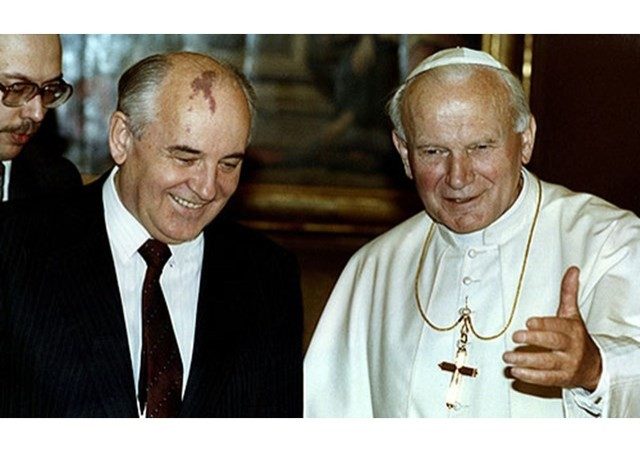The Fall of Communism
The 20th & 21st Centuries
Vatican Archives
In 1978, a Polish prelate named Karol Wojtyła became Pope John Paul II. He visited his native country in 1979 and preached to huge crowds, encouraging them to stay true to Poland's faith and heritage, and to remain in solidarity with each other. The following year, a group of Polish shipyard workers led by Lech Wałęsa went on strike and formed a trade union called Solidarity. The communist government declared this union illegal and instituted martial law, but the Soviet Union chose not to intervene, and so the workers continued their resistance. By the end of the decade, the communists had accepted that they would need to work with the union, and not against it. Expecting to remain in control with a coalition government, the communists allowed open elections in 1989. They were voted completely out of power.
Demonstrations immediately erupted in East Germany, where the communist government announced that the Berlin Wall would be dismantled. The people of Berlin did not wait for the government to do it. By the end of the year, the Velvet Revolution ended communist rule in Czechoslovakia, and the communist leader of Romania was violently overthrown. The East German government fell apart and both halves of Germany were reunited in 1990.
The following year, Ukraine declared independence. Soviet Premier Mikhail Gorbachev was overthrown in a coup and the Communist Party, which had ruled Russia for 73 years, was banned. Estonia, Latvia, Lithuania, Belarus, Moldova, Georgia, Armenia, Azerbaijan, Turkmenistan, Uzbekistan, Tajikistan, Kyrgyzstan, and Kazakstan all became independent states, and by the end of 1991, the Soviet Union was no more.
Freedom from Soviet censorship resulted in somewhat of a cultural revival among the newly independent nations of Eastern Europe, and a rise in the international popularity among composers who had struggled artistically against communist authorities.
In Poland, the first country to break free of communist rule, a number of composers came to prominence. Foremost among them is Krysztof Penderecki, who became famous for his Threnody for the Victims of Hiroshima, but later wrote religious works in support of Poland's Solidary movement. Another Polish composer, Henryk Górecki composed his Miserere ("Lord, have mercy") to protest the communists' violent treatment of peaceful Solidarity members. Due to government censorship, the piece was not premiered for six years. The composer Witold Lutoslawski had long seen his works denounced by authorities, and received high honors after the fall of communism.
György Ligeti was a Hungarian composer who chafed under communism and fled to Germany. Much of music is based on traditional Renaissance polyphony, although it can be difficult to discern this while listening to it. His music became famous when Stanley Kubrick used some of it in the movie 2001: A Space Odyssey.
The Estonian composer Arvo Pärt based many of his works on Gregorian Chant and Russian Orthodox liturgical music, which often caused them to be condemned or censored by communist authorities when Estonia was part of the Soviet Union.
